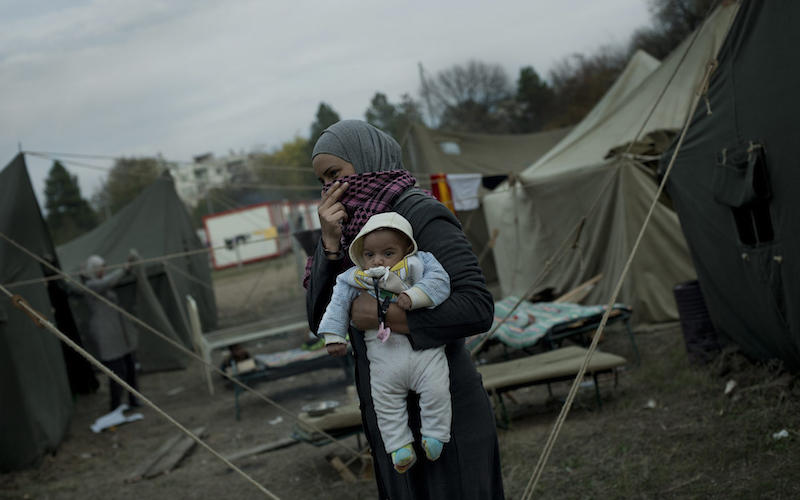
U.S. & Turkish Cooperation on Syrian Refugees
Each year the United States President and Congress determine the number of refugees to be admitted to the U.S. The 2016 FY proposal was for 85,000 refugees. According to UNHCR, by the beginning of 2015 there were an estimated 14.4 million refugees worldwide and over 4.2 million were Syrian. On September 10, 2015 President Obama stated that he was prepared to allow 10,000 or .0001 percent of Syrian refugees to immigrate to the U.S. in FY 2016.
But since 2011, out of the 18,336 Syrian refugee referrals there have only been roughly 2,200 Syrians resettled in the U.S. who are trying to rebuild their lives in America after losing everything in their homeland. Seeking asylum is the first step for refugees. However, permanent resettlement is the only long-term solution that provides a normal life and yet fewer than 1 percent of global refugees were referred for resettlement by the UN refugee agency in 2014. Refugees who resettle in foreign lands whether it be in the U.S. or Europe face everyday challenges such as navigating daily life, rebuilding a career, and learning a new language.
The refugee crisis continues to be an issue not only in Syria and the surrounding regions but also in Washington, D.C. as the House passed legislation halting President Obama’s promise to take in 10,000 Syrian refugees in FY 2016.
On November 19, 2015 the GOP sponsored bill passed with a 289-137 vote majority which will increase the vetting process of resettlement to include lengthy background investigations by the FBI.
Other stipulations of the screening process will include interviews, biometric collections, religious affiliations, and family histories among other authenticity checklists. President Obama threatened to veto the bill if it reaches his desk commenting on Twitter, “slamming the door in the face of refugees would betray our deepest values. That’s not who we are. And it’s not what we’re going to do.” Newly elected House Speaker Paul Ryan defended his support of the bill, “We are a compassionate nation. We always have been, and we always will be. But we also must remember that our first priority is to protect the American people.” The bill comes after a horrific terrorist attack by ISIS in Paris over the weekend prior to the G20 Summit held in Antalya, Turkey. The world’s top leaders came together to discuss the global economy but the weekend’s events quickly focused on discussions for joint action against terrorism.
At the conclusion of the G20 Summit, President Obama and President Erdogan presented a united front on combating terrorism along with a promise to alleviate the burden on Turkey’s refugee crisis. The U.S. has historically been the leader in providing humanitarian assistance to displaced persons but with the controversy surrounding refugees and their ties to ISIS there has been a drastic change. In his concluding speech to the summit, President Obama announced, “Turkey has been a strong partner with the United States and other members of the coalition in going after the activities of ISIL or Daesh both in Syria and Iraq.” The cooperation of the U.S. and Turkish militaries has increased over the last week in hopes of combating ISIS and gaining control of the regions bordering Syria.
The world finally began paying attention to the refugee crisis when the media published images of a three year-old Syrian refugee washed up on a Turkish beach. This past week, New York City Mayor Bill de Blasio reminded America of the horrific image and the repercussions that the newly passed legislation will have on future refugees trying to escape persecution from ISIS. In a press release on November 18, 2015, Mayor de Blasio stated, “This is the cost of not bringing in people who are innocent victims of humanitarian crisis.” Turkey has vigilantly provided help to refugees with clothing, shelter, education but also healthcare infrastructure.
At an event hosted by the Turkish Heritage Organization, Dr. Fuat Oktay from the Turkish Disaster and Emergency Management Authority (AFAD) stressed that Turkey needs the support of the international community to build capacity in the healthcare and education systems for refugees. Dr. Oktay called for a more robust international response to the Syrian refugee crisis in assisting Turkey on all levels of need. The Turkish Heritage Organization’s President, Halil Danismaz agreed with Dr. Oktay insisting, “Turkey is doing much to support Syrian refugees but cannot continue to do so alone. Additional support with Turkey’s allies, including the U.S., is required in order to make this effort sustainable.” Turkey continues to accept refugees and has provided financial assistance of over $8 billion USD. There are 2.2 million refugees living throughout the country.
The U.S. vows to continue its support for Turkey by providing humanitarian aid as well as military assistance but the U.S. could do more. The newly passed House legislation will affect the U.S.’s ability to make good on its recent promises of increasing the numbers of Syrian refugees admitted to America. Only time will tell if the congressional legislation will prevent thousands of Syrians from finding a new home in America.

